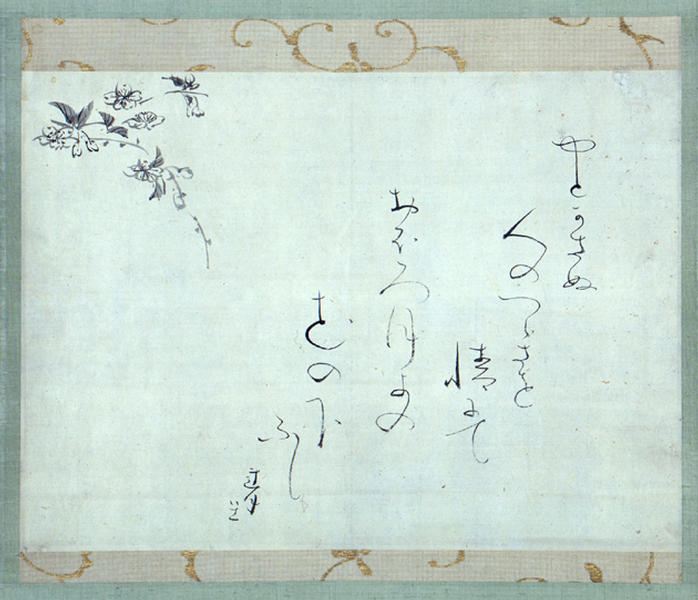山桜図(大田垣蓮月筆)
- 江戸時代
- 19c
- 紙本墨書墨画
- H-31 W-42.5
解説(春の玉手箱)
太田垣蓮月(一七九一~一八七五)は幕末の女流歌人。二度の結婚のうち、夫、子ども等と次々に死別し仏門に入る。京都岡崎で生活のため陶器作りを始め、手びねりの陶器に自作の歌を彫り付けたものが「蓮月焼」として文人たちを中心にもてはやされた。また六〇歳の時、当時一五歳の富岡鉄斎と知り合い、蓮月の和歌に鉄斎が絵を描く合作などで鉄斎の画業を助けたりして、大きな影響を与えた。
本作品の和歌は、一夜の宿を請うが入れられず、そのため月夜の山桜を愛でながらの野宿となったと、その非情を御仏の慈悲に置き換えて詠まれている。画面左上角からわずかにのぞく山桜の枝が、見上げる蓮月の清らかな心情と重なって美しい。
やとかさぬ 人のつらさを 情けにて
おぼろ月よの 花の下ふし
Catalogue Entry
Otagaki Rengetsu (1791‐1875) was a woman poet of the late Edo period. She married twice, but tragically lost both her husbands and children and in the end entered Buddhist orders. She began a pottery kiln in the Okazaki district of Kyoto to support herself, and her hand‐formed “Rengetsu ware" carved with her own poems became popular chiefly amongst the liter‐ati of her day. At the age of 60 she befriended the then 15 year old Tomioka Tessai, and she influenced the career of this literati painter, inscribing her waka poems on his paintings and generally helping with his career.
This poem tells of a person unkindly refused lodging for the night, who then experiences a wonderful moonlit night beneath flowering mountain cherry trees as a result. Thus, the Buddha's benevolence turns misfortune to fortune in our lives. A small glimpse of the branch of a mountain cherry tree blooms in the upper left of the composition, filled with the beauty of Rengetsu's pure spirit, gazing up at it.
